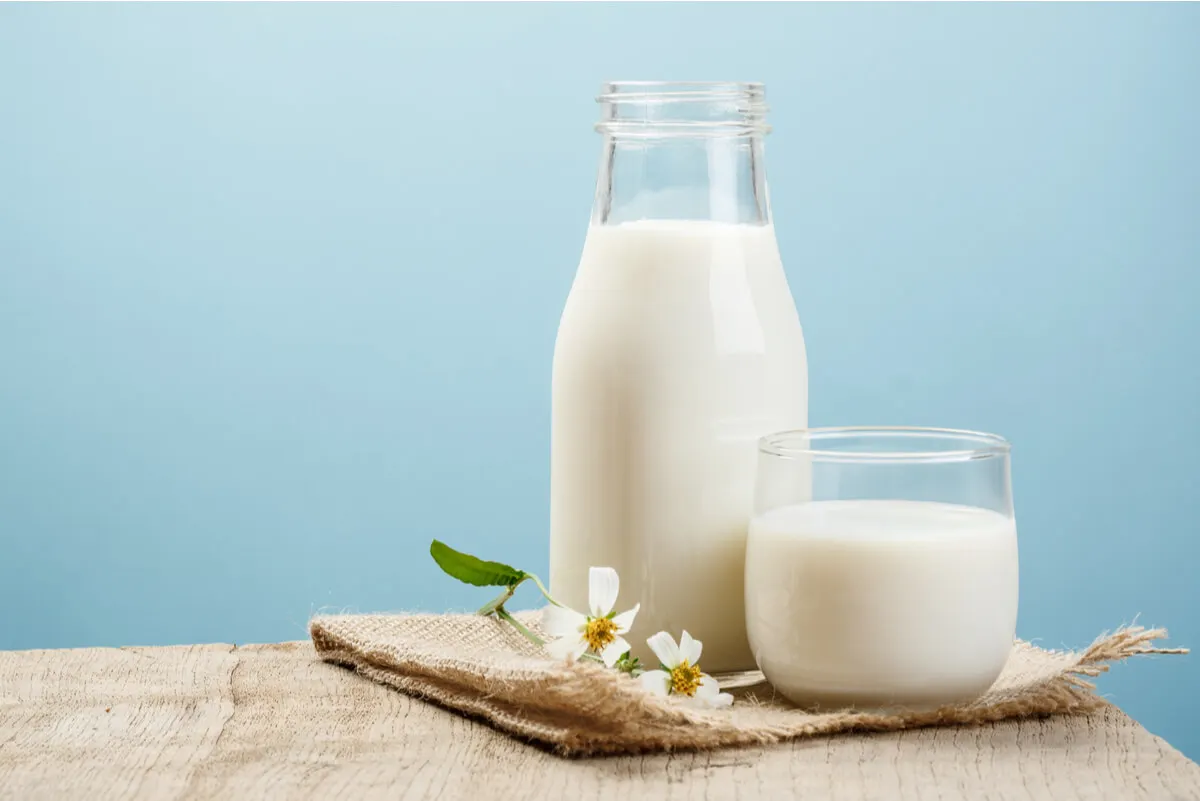Polycystic Ovary Syndrome: Recommended Diet and Nutrition


Written and verified by the nutritionist Anna Vilarrasa
When it comes to the management of polycystic ovary syndrome, diet, and nutrition play a very important role. In particular, it’s necessary to control elevated insulin levels and inflammatory status. And while many are unaware of it, food is a key contributor.
The most appropriate dietary pattern is one with plenty of vegetables, fruits, legumes, whole grains, lean proteins, and moderate-fat dairy. Following this type of diet can improve symptoms and some of the conditions associated with the disease. Want to know more about it? Read on!
Polycystic ovary syndrome: the role of diet and lifestyle habits
Polycystic ovary syndrome (PCOS) is more common than many people think. It’s estimated that it can affect one in five women of reproductive age. However, many of those affected are undiagnosed.
When suffering from PCOS there is an ovulatory dysfunction and an overproduction of androgens of unknown origin. As a consequence, alterations appear in the menstrual period and other symptoms ranging from acne and oily skin to fertility problems.
For the moment, there is no cure, but there is medication to control the symptoms. In addition, experts point out the importance of lifestyle habits in managing the disease.
With proper diet and exercise it’s possible to regulate abnormally elevated glucose and insulin levels. Incidentally, this improves symptoms and fertility problems. It even reduces the risk of cardiovascular disease, hypertension, and hyperlipidemia.

Polycystic ovary syndrome: diet and nutrition recommendations
At the moment there is no standard dietary plan for this disease. However, it’s generally known that some foods are more recommended than others. These are some of the appropriate features and guidelines in the recommended diet for PCOS.
Ensure the presence of fiber
Foods that provide dietary fiber improve insulin resistance. They slow digestion, thereby regulating blood glucose surges. To this end, many of these options can be included on a daily basis:
- Legumes
- Whole wheat bread
- Varied seeds
- Vegetable
- Berries
- Almonds, peanuts, pine nuts
We think you may be interested in reading this, too: Polycystic Ovary Syndrome Could Finally Have a Cure
Make sure to consume anti-inflammatory foods
Recent studies indicate that polycystic ovary syndrome is related to chronic low-grade inflammation. Some foods such as olive oil, oily fish, nuts, berries, or green leafy vegetables have anti-inflammatory activity that may improve this condition.
Prefer whole grains over refined carbohydrates
Whole grains provide fiber, vitamins, and minerals that white cereals have lost. In addition, the latter accentuates insulin resistance and can generate an inflammatory state. This is also true for sugar and foods with an excess of added sugars.
Adopt a diet with nutrient-dense foods
In this regard, it’s best to fill the pantry with fresh produce and avoid ready meals, snacks, sweets, and fast food. These are often made with poor-quality ingredients and contain considerable doses of added sugar, hydrogenated fats, refined flours, and salt.
Fruits, legumes, nuts, and vegetables, on the other hand, provide interesting amounts of vitamins and minerals. Therefore, they become the best choice for both meals and snacks.
Avoid advanced glycation products
Environmental factors seem to play an important role in the development of polycystic ovary syndrome; among these, we find advanced glycation products. Advanced glycation products occur normally both outside and inside the body. However, diet is one of the major contributors.
When they are found in excess, the body cannot handle them and they tend to generate health problems. At the dietary level, their contribution can be reduced by following these guidelines:
- Avoid cooking with very strong dry heat, such as grilling or baking.
- Limit consumption of foods more prone to generate them, such as eggs, fried potatoes, processed foods, or fast food.
Limit sources of gluten and dairy
At the moment, there is no scientific evidence on the need to withdraw foods with gluten and dairy. However, sometimes their withdrawal may improve the inflammatory state.
If there is no improvement with the dietary changes implemented, a gluten- and dairy-free diet can be tried. In this case, it’s advisable to consult a dietitian to find suitable substitutes without resorting to poor-quality processed products.

When is it necessary to consult a professional?
One of the problems with the diagnosis of polycystic ovary syndrome is that its symptoms can be very general and not very specific. Thus, many women may think they have other health problems or do not find them serious enough to discuss with their doctor.
Sometimes it’s not until problems conceiving occur that they are noticed. The most common signs are as follows:
- Acne, oily skin, and dandruff
- Weight gain
- Hair growth on the face, back, or chest
- Irregular menstrual periods or bleeding
- Discomfort or pain in the pelvic area
- Difficulties in getting pregnant
Thus, in case of suffering from any or several of them, it’s a good idea to consult a health professional. The sooner it can be diagnosed and treated, the faster the symptoms and well-being of affected women will improve.
In addition, it’s possible to avoid some diseases associated with PCOS. As indicated by the Academy of Nutrition and Dietetics of the United States, this condition increases the risk of insulin resistance, type 2 diabetes, high blood pressure, anxiety, and depression.
Like this article? You may also like to read: Polycystic Ovarian Syndrome and its Treatment
Final recommendations on polycystic ovary syndrome and its recommended diet
Polycystic ovary syndrome (PCOS) is a common pathology among women. It has different clinical implications including metabolic, reproductive, and psychological problems.
Pharmacological treatment should be accompanied by a change in lifestyle. Applying dietary and physical activity measures is key to improving these problems and increasing the quality of life and emotional health.
In general, the best foods are vegetables, fruits, nuts, whole grains, olive oil, and oily fish. In addition, it’s necessary to limit the presence of sugary drinks, juices, processed meats, sweets, and prepared foods.
However, before implementing any changes, it’s advisable to consult your doctor or a specialized dietitian. Each diagnosis is different and each case may require a dietary plan with specific characteristics.
All cited sources were thoroughly reviewed by our team to ensure their quality, reliability, currency, and validity. The bibliography of this article was considered reliable and of academic or scientific accuracy.
- Ellis E. Polycystic ovary syndrome. EatRight. Academy of Nutrition and Dietetics. Septiembre 2021.
- Harvard Health Publishing. Foods that fight inflammation. Harvard Medical School. Noviembre 2021.
- López-Alarcón M, Perichart-Perera O, et al. Excessive refined carbohydrates and scarce micronutrient intakes increase inflammatory mediators and insulin resistance in prepubertal and pubertal obese children independently of obesity. Mediators of inflammation. 2014. 2014: 849031.
- Office on woman’s health. Polycystic ovary syndrome. Abril 2019. U.S. Department of Health and Human Services.
- Pinkerton J. A. Síndrome del ovario poliquístico. Manual MSD. Diciembre 2020.
- Rocha A. L, Oliveira F. R, et al. Recent advices in the understanding and management of polycystic ovary syndrome. Food Research. Abril 2019. 8: F1000. Faculty Rev-565.
- Rutkowska A. Z, Diamanti-Kandarakis E. Do advanced glycation end products (AGEs) contribute to the comorbidities of polycystic ovary syndrome (PCOS)? Current Pharmaceutical Design. 2016. 22 (36): 5558-5571.
- Teede H, Deeks A, Moran L. Polycystic ovary syndrome: a complex condition with psychological, reproductive and metabolic manifestations that impacts on health across the lifespan. BMC Medicine. Junio 2010. 30 (8): 41.
- Teede H, Misso M, et al. International evidence-based guideline for the assessment and management of polycystic ovary syndrome. Australian Government. National Health and Medical Research Council. Febrero 2018.
This text is provided for informational purposes only and does not replace consultation with a professional. If in doubt, consult your specialist.








